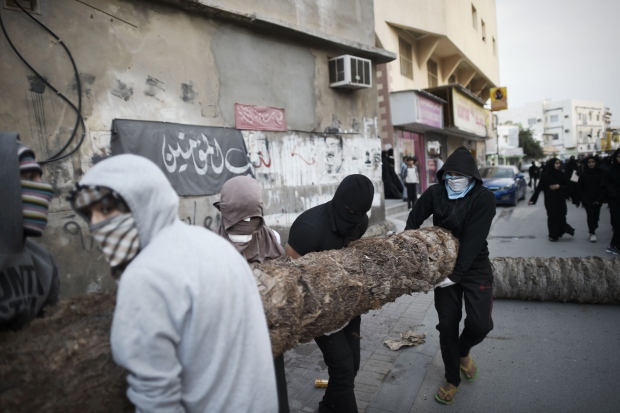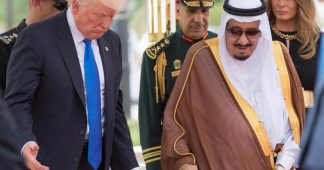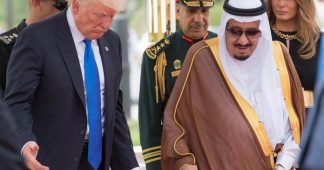Washington’s tolerance for such dictatorships undermines its criticism of Iran and other authoritarian governments.
By February 28, 2018
Republicans often criticized the Obama administration for “mistreating” our allies. Many of them seemed to believe that collecting allies was a bit like accumulating Facebook friends: the more the merrier—never mind whether they share Americans’ values. Some of President Donald Trump’s dearest foreign “friends” are authoritarian brutes at home, violating human rights that most Americans claim to hold dear.
The problem is not that Washington makes difficult accommodations with powerful and important nations. It is that U.S. officials look foolish when they ignore the chasm between rhetoric and practice that others so clearly see.
One of the worst cases is Bahrain, the Shia-majority kingdom that hosts the U.S. Fifth Fleet in its capital Manama. The monarchy there has long favored the minority Sunnis, establishing a system that some critics have compared to South African apartheid. In 2011, the Arab Spring yielded a vibrant Bahraini democracy movement led by the oppressed majority Shia that embarrassed the autocratic kingdom. The regime had to rely on Saudi troops to brutally crush all opposition. Observed the New York Times: “Bahrain’s royal family has used tanks, riot police officers, sweeping arrests and tight censorship to thwart demands for democracy among the Shiite Muslim majority.”
A supposed dialogue with critics proved to be but a façade, as criticism led to arrest and prison. Some 14 death sentences were handed down for alleged “terrorist” offenses. Scores of opponents were stripped of their citizenship. Some critics were banned from traveling abroad, while others disappeared, later to end up before military courts. No one was safe. McClatchy reported at the time:
“Authorities have held secret trials where protesters have been sentenced to death, arrested prominent mainstream opposition politicians, jailed nurses and doctors who treated injured protesters, seized the health care system that had been run primarily by Shiites, fired 1,000 Shiite professionals and canceled their pensions, detained students and teachers who took part in the protests, beat and arrested journalists, and forced the closure of the only opposition newspaper.”
The regime brought in Pakistani and Syrian Sunnis to staff its burgeoning security agencies. It also sought to attract Sunni immigrants, fast-tracking their citizenship applications to diminish the Shia population’s edge (70 to 75 percent of total Bahrainis). Manama even launched a campaign to destroy Shia mosques, calling them “illegal buildings.”
At least the Obama administration evidenced some discomfort at the vicious crackdown. Although the State Department still expresses concern from time to time, President Trump has ignored the repression. Indeed, last spring the president, while meeting Bahrain’s ruler Sheikh Hamad bin Isa al-Khalifa, said: “Our countries have a wonderful relationship together.” While there had been past tensions, he allowed, “there won’t be strain with this administration.”
The latest assault on human rights by the Bahraini regime is a five-year sentence imposed on Nabeel Rajab, president of the Bahrain Center for Human Rights. In 2012, he was sentenced to three years in jail for encouraging protests. He is currently serving a two-year sentence for criticizing the monarchy’s crimes in a television interview. The latest punishment is for “insulting national institutions” with tweets that reported the torture of prisoners. Rajab also faces additional charges because of the 2016 New York Times op-ed that he wrote while in jail complaining that the regime was the kind of American ally “that punishes its people for thinking, that prevents its citizens from exercising their basic rights.”
Last year the al-Khalifa government targeted the family of human rights activist Sayed al-Wadaei, who had been stripped of his citizenship and forced into exile. Manama arrested his cousin, mother-in-law, and brother-in-law, and in October sentenced all three to prison on dubious charges. Human Rights Watch cited “due process violations and allegations of ill-treatment and of coerced confessions.” The regime had previously threatened his wife, young son, and other relatives with arrest and torture.
Repression has been a constant of Bahraini policy. In the aftermath of the 2011 crackdown, King Hamad created the Bahrain Independent Commission of Inquiry to investigate human rights abuses. BICI reported that hundreds of people have been convicted for peacefully protesting and criticizing the government. It recommended that “all persons charged with offenses involving political expression, not consisting of advocacy of violence, have their convictions reviewed and sentences commuted or, as the case may be, outstanding charges against them dropped.” Alas, far from redressing past crimes, the regime has doubled down, attempting to extirpate dissent.
“Little has changed in the administration of criminal cases in Bahrain,” reported HRW in 2014. In many cases defendants are convicted “of ‘crimes’ based solely on the peaceful expression of political views or the exercise of the rights to freedom of association and peaceful assembly.”
Abuses by security forces continue and remain generally immune from punishment. This situation is “impossible to reconcile with even minimal standards of justice,” noted HRW.
Moreover, torture is government policy. BICI reported that security agencies “followed a systematic practice of physical and psychological mistreatment, which in many cases amounted to torture, with respect to a large number of detainees in their custody.”
Despite regime promises of reform, a 2015 HRW report found that “Bahraini authorities have failed to effectively implement the BICI recommendations for combating torture; that the new offices have failed to fulfill their mandate; and that Bahraini security forces continue to torture detainees.” Women are especially vulnerable: human rights activist Ebtisam al-Saegh was beaten and sexually assaulted after her arrest in 2017.
Large-scale repression has undermined what was once a growing if limited civil society. Facing special scrutiny have been political organizations and labor unions. Noted a 2013 HRW report, “authorities use the law to suppress civil society and restrict freedom of association in three main ways: by arbitrarily rejecting registration applications and intrusively supervising NGOs; taking over and dissolving—more or less at will—organizations whose leaders have criticized government officials or their policies; and severely limiting the ability of groups to fundraise and receive foreign funding.”
The repression continues, year in and out. Last month HRW reported that “Bahrain continued its downward spiral on human rights during 2017 as the government harassed, intimidated, imprisoned, and prosecuted human rights defenders and their relatives on charges that should never have been brought.” HRW’s Sarah Leah Whitson said that “Bahrain’s tolerance for dissent is approaching a vanishing point, erasing whatever progress it made after promising to make reforms following the unrest in 2011.”
Indeed, earlier this year Freedom House rated Bahrain “Not Free,” near the bottom internationally for civil liberties and political rights. “Once a promising model for political reform and democratic transition, Bahrain has become one of the Middle East’s most repressive states,” reported FH, and the government has lately intensified its “drive to outlaw peaceful political opposition.” Unsurprisingly, Bahrain is rated unfree on separate indices for press and internet freedom as well.
Even the State Department cannot deny the obvious. Its latest 47-page human rights report cites “limitations on citizens’ ability to choose their government peacefully, including due to the government’s ability to close arbitrarily or create registration difficulties for organized political societies; restrictions on free expression, assembly, and association; and lack of due process in the legal system, including arrest without warrants or charges and lengthy pretrial detentions—used especially in case against opposition members and political or human rights activists.”
But that’s not all. “Other significant human rights problems included lack of judicial accountability for security officers accused…of committing human rights violations; defendants’ lack of access to attorneys and ability to challenge evidence; prison overcrowding; violations of privacy; and other restrictions on civil liberties, including freedom of press and association.” State also cited social discrimination against Sunnis, “travel bans on political activists,” and revocation of citizenship.
No wonder Nabeel Rajab used his New York Times article to ask then-secretary of state John Kerry: “Is this the kind of ally America wants?” How would Kerry’s successor, Secretary Rex Tillerson, respond? And President Trump?
The world is a messy place, and sometimes tough, unpleasant decisions must be made. But backing repressive regimes is costly: the majority of Bahrainis cannot help but see America as aiding their oppressors. And Washington’s tolerance for brutal dictatorships undermines its criticism of Iran and other authoritarian governments.
At the very least the U.S. should eschew the close embrace and rhetoric of friendship. More fundamentally, Washington should rethink the interventionist policies that force it to rely upon such authoritarian regimes. The Middle East no longer maintains an energy stranglehold. Israel is a regional superpower capable of defending itself, and its emerging alliance with the Gulf States has created a strong balance of power against Iran. America can begin to step back.
In the meantime, Trump should call up his buddy the king and urge the release of Nabeel Rajab. If the president is going to pal around with assorted dictators, he might as well achieve something positive for his trouble. Freeing a human rights hero would be a good start.
Doug Bandow is a senior fellow at the Cato Institute. A former special assistant to President Ronald Reagan, he is author of Foreign Follies: America’s New Global Empire.











